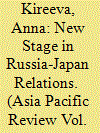|
|
|
Sort Order |
|
|
|
Items / Page
|
|
|
|
|
|
|
| Srl | Item |
| 1 |
ID:
170244


|
|
|
|
|
| Summary/Abstract |
Since May 2016 Russia-Japan relations have entered a new stage characterized by the unprecedented activity aimed at improving relations in a comprehensive way: political and security dialogue, confidence building measures, new economic projects and people-to-people contacts. However, apart from the old problems, new limitations and asymmetries have emerged that hinder the development of bilateral relations against the background of power shift and changing strategic environment in East Asia. The article seeks to assess how deep is Russia-Japan rapprochement, what are the motivations of the two countries, major limitations, both domestic and external, expectation asymmetries and misperception gaps. It discusses the developments after the agreement between Russia’s President Vladimir Putin and Japan’s Prime Minister Shinzo Abe in November 2018 to facilitate negotiations on a peace treaty and territorial issue based on the Soviet-Japanese Declaration of 1956, and how tangible is a breakthrough. The article concludes by providing an argument for forging stronger Russia-Japan partnership and discusses the potential of bilateral relationship.
|
|
|
|
|
|
|
|
|
|
|
|
|
|
|
|
| 2 |
ID:
136645


|
|
|
|
|
| Summary/Abstract |
As the center of world economic growth and world politics is shifting to East Asia, the region is undergoing a strategic transformation due to the ongoing power shift. As a result, major regional powers, namely the USA, China, Japan, India, South Korea, Australia and South East Asian states are building up their military potential, in particular naval forces, amid aggravating regional security problems and escalation of maritime disputes. This paper aims to assess regional strategies and military buildup in the Indo-Pacific. With the USA seeking to preserve dominance in the region, China trying to realign the regional power dynamics in its favor, Japan aiming to preserve its place as one of the regional leaders, India and Russia with their goals to become independent powers, and middle and small powers searching for an adequate answer to regional challenges, East Asia and the Indo-Pacific are clearly showing a complex dynamics of competing regional strategies and visions of regional order.
|
|
|
|
|
|
|
|
|
|
|
|
|
|
|
|
| 3 |
ID:
189253


|
|
|
|
|
| Summary/Abstract |
This article analyses wedge strategies in the context of Russo-Japanese relations. In particular, it looks at how both countries have sought to generate a dis-alignment in the opposing side, preventing further steps toward the consolidation of potentially threatening partnerships: the US-Japan alliance for Russia, and the Russia-China entente for Japan. After identifying the respective goals of Russia and Japan, the article examines the conditions that enable the success of wedge strategies. Looking at the case of Russia-Japan relations from 2012 to 2020, the article argues that a strategy constituted of a mix of positive economic and political incentives and a limited amount of coercion can succeed in producing a degree of dis-alignment in the opposing camp. Russia’s strategy seems to be more productive than Japan’s since Moscow has managed to minimize the effect of sanctions imposed by Japan and it has reduced political differences to mostly bilateral and regional issues. A greater level of cooperation with established partners for both Russia and Japan, and limited costs of wedging strategies, have resulted in dis-alignment but not a reversal of existing alignments. The article also indicates that in this case credibility issues do not fundamentally affect the degree of success of wedge strategies.
|
|
|
|
|
|
|
|
|
|
|
|
|
|
|
|
|
|
|
|
|